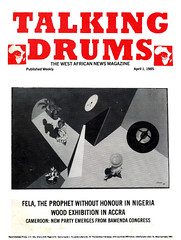Dikko - the catch 22
"How the Home Secretary is planning to get around the bit of bother that has to do with the events of July 5, 1984 on the streets of London when Alhaji Dikko was forcibly abducted is yet to be seen" - by a correspondent.There is a bird in Ghanaian folklore that has a reputation of being impossible to do without and equally impossible to have. In other words, whichever way you treat this 'satrofi' bird, you end up losers. One does not know what the Santrofi itself thinks about this reputation that is has.
In many ways Alhaji Umaru Dikko the former Nigerian Transport Minister seems to be in a similar position. If ever there has been a question of stirring a hornet's nest, that is what happened when the Federal Military Government pledged to the Nigerian nation that they will bring back the former Transport Minister to Nigeria. Having staked their reputation or possibly to their minds, military prowess, on the pledge, the Nigerian press was not about to ever make them forget it.
And then of course the press discovered that the word 'Dikko' sells papers and at every opportunity found stories both imaginary and real about him to boost their sales. But it does look as though the conflicting signals about Dikko continue to be flashed.
Sunday Times (London) March 24 1985 under the headline "Dikko may have to go," the paper carried a story by a Kim Fletcher which said that it was thought likely that Dikko's application for political asylum in Britain would be rejected. The paper said "the decision expected to be announced soon by the Home Secretary would open the way for the Nigerian government to achieve through the courts what it failed to achieve illegally; without the protection of political asylum, Dikko could then be liable to extradition".
New Nigerian (Kaduna, and Lagos) March 20 1985. Under the Your Views column a reader's letter with the headline: "We are not interested in Dikko's return but food". The letter signed by a Shola Ibraheem of P.O. Box 252 Ikeja, Lagos said:
"Hardly a week that I do not read about either Umaru Dikko or other fugitives. I, as a layman, know that the government is wasting time when talking about extradition of Umaru Dikko. Since Enahoro 20 years ago, the British Government had ceased extraditing anybody declared wanted for political reasons.
"What is the logic in the Nigerian Government asking for the extradition of some politicians and at the same time signing accord or whatever you call it that Nigeria will never extradite anybody that is in Nigeria for political offence? Now let us call a spade a spade. As far as an average Nigerian is concerned, it does not make any difference whether Dikko is brought to Nigeria or not.
What matters is the rate of unemployment, the price of garri - what is important to me and other Nigerians is availability of our daily bread. Who cares whether you bring back Dikko or Wayas? I can assure you Dikko, Wayas etc., would come to Nigeria sooner or later, it is a question of time.
Alhaji Umaru Dikko
Is Ojukwu not in Nigeria now? Was he not declared wanted sometime? Didn't Gowon come to Nigeria with VIP treatment? Let me say it loud, people are suffering. Nigerians are ready to sacrifice, but leaders also should lead by example."
It is a sign of the times really that such a letter could have been published in the 'New Nigerian'. This is the paper which had more than identified itself with the rulers of the second Republic and therefore felt it had to prove its loyalty to Gen Buhari more fiercely than others. The paper had been particularly vociferous in whipping up public sentiment against Dikko 'and the other fugitives'. To have published such a letter could not have been accidental and keen observers have not missed the implications.
The fact that Nigeria might not be interested in having Dikko sent back does not help the dilemma that faces the British Home Secretary. There are unspoken factors that are doubtless affecting the decision. There is the case of the two British aircraft engineers being held in Lagos. Nobody wants to use the word 'hostage' but it is unlikely that both the British and Nigerians are under any illusion that the two men have become pawns in the hands of the Nigerian military government.
No British Home Secretary is willingly going to project himself as the man who abandoned two Britons to the savage mercies of the rats in Kirikiri prison just to protect one Nigerian wanted in his country, as the government claims, for massive corruption. Even though nobody will admit as much, the great British market factor is undoubtedly playing an important part in the considerations. When it comes to things like £800 million worth of trade last year, such figures concentrate the British mind most acutely. Secret military tribunals suddenly don't sound as reprehensible.
Constitutionally elected governments having been violently overthrown suddenly pale into insignificance. How the Home Secretary is planning to get around the bit of bother that has to do with the events of July 5, 1984 on the streets of London when Alhaji Dikko was forcibly abducted and put in a crate, is yet to be seen, but then the British are famous for their 'historic compromises' and finding a way out of sticky situations.
The person that must be wishing he had never uttered the name of Dikko must surely be Gen Buhari. Whatever political points he had hoped to score by producing Dikko in Lagos have all been lost already and people are now openly saying they will be quite unimpressed by it. And yet, he dares not say that he will forget about Dikko either. Whatever will he or the newspapers have to talk about?
